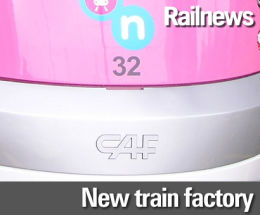Posted 13th July 2017 | 2 Comments
Newport chosen for new train-building plant

A NEW factory manufacturing trains and trams is to be built by Spanish rolling stock company CAF at Newport in south Wales. Up to 300 jobs will be created, including apprenticeships.
CAF is investing £30 million in the project, and has also been aided by a grant from the Welsh Government.
The new facility will be over 46,000 square metres in size and will employ 200 people when it opens in the autumn of next year, rising to 300 by 2019. It is being designed so that CAF can build a range of different rolling stock, including diesel multiple units, electric multiple units, trams and high speed trains.
CAF’s UK Director Richard Garner said: “The factory will have the flexibility to allow us to respond to the exacting demands of both existing and new customers by providing the most complete offering of any rolling stock provider operating in the UK.”
Today's announcement comes during the three-day state visit to Britain of the King and Queen of Spain.
CAF has already Spanish-built trains and trams to British networks, including trams for Edinburgh and Midland Metro. It now has orders for 31 three-car and 12 four-car EMUs, and 25 two-car and 30 three-car DMUs for the new Northern franchise. In addition, there are 12 five-car EMUs and 66 coaches for TransPennine Express and 75 coaches for Caledonian Sleeper.
Richard Garner added: “CAF is an established supplier to the UK market, and we now have a solid economic basis for further increasing our footprint. The establishment of this facility will serve CAF’s long-term aspirations to be a major player in the UK market for many years to come.
“CAF is responding to demands made by its customers who are asking for British trains, manufactured by British workers using British-based suppliers.”
CAF said it had considered more than 100 possible sites in the United Kingdom before choosing the former Llanwern steelworks site at Newport. The company also plans to develop a ‘cluster’ of local and national companies to supply components for its trains.
It is now planning to compete for further orders from Transport for London, High Speed 2 and several forthcoming franchises including Southeastern and Wales & Borders.
Welsh First Minister Carwyn Jones said: “Today’s announcement is a major coup for Wales and a big vote of confidence in Wales’ manufacturing industry. We are, once again, competing and beating others on the world stage to secure significant investment to Wales.”
The news has also been welcomed by transport secretary Chris Grayling. He said: “I am delighted that 300 jobs for skilled workers will be created in South Wales as part of CAF’s multi-million pound investment in the UK and our transport network. Manufacturing is one of the pillars of British industry and British engineers are among the best of the world – so it is tremendous news that CAF has chosen to base their factory here to build the latest trains.”
CAF plans to start recruitment in the spring of 2018, and will be offering training and apprenticeship schemes from the autumn.
The plant will become the first site manufacturing trams in Britain since Bombardier took over the former Adtranz works at Litchurch Lane, Derby in 2001, and transferred future tram production to its specialist site in Vienna. The last trams to be built at Derby were the original vehicles for Nottingham Express Transit.
Reader Comments:
Views expressed in submitted comments are that of the author, and not necessarily shared by Railnews.

Andrew Gwilt, Basildon, Essex
New trains for Northern Trains. But also CAF could also manufacture the new trains for Wales with new EMU and Bi-Mode trains to operate on the Welsh lines and on the Valley Lines with the Great Western electrification to continue that will pass through Cardiff Central and eventually end at Swansea with Hitachi's Class 800's and Class 801's to be in service from late this year and next year-onwards once the electrification is completed.
MikeB, Liverpool
With the possibility of having four train-building companies in the UK (CAF, Bombardier, Hitachi and Alstom) the TOCs and DfT will have to ensure that rolling stock is replaced on a regular basis, in order that all four plants are kept busy. Otherwise one or more of these companies will not last the course and British jobs will be lost.